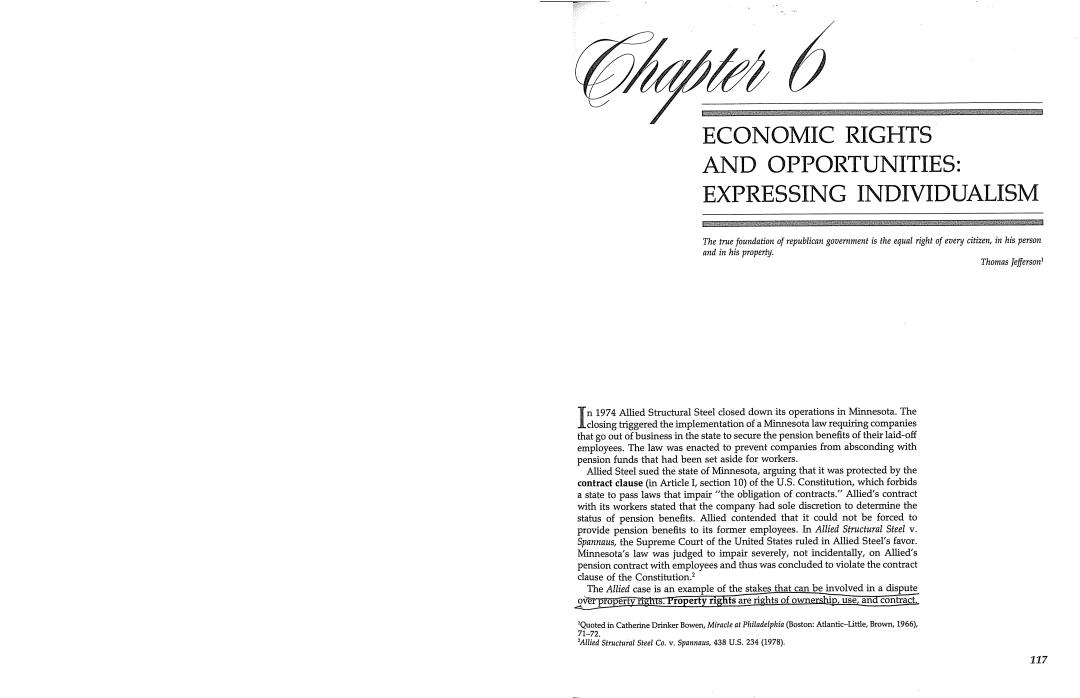
Chgnn b ECONOMIC RIGHTS AND OPPORTUNITIES: EXPRESSING INDIVIDUALISM The te foundation of republicnn govermment is the egual right of every citizen,in his person dnh格p7opey. Thomos leferson n 1974 Allied Structural Steel closed down its operations in Minnesota.The Lclosing triggered the implementation of a Minnesota law requiring companies that go out of business in the state to secure the pension benefits of their laid-off employees.The law was enacted to prevent companies from absconding with pension funds that had been set aside for workers. Allied Steel sued the state of Minnesota,arguing that it was protected by the contract clause (in Article I,section 10)of the U.S.Constitution,which forbids a state to pass laws that impair"the obligation of contracts."Allied's contract with its workers stated that the company had sole discretion to determine the status of pension benefits.Allied contended that it could not be forced to provide pension benefits to its former employees.In Allied Strctural Steel v. Spwuiaus,the Supreme Court of the United States ruled in Allied Steel's favor. Minnesota's law was judged to impair severely,not incidentally,on Allied's pension contract with employees and thus was concluded to violate the contract clause of the Constitution. The Allied case is an example of the stakes that can be involved in a dispute over property ights.Property rights are rights of ownership,use,and contract. Quoted in Catherine Drinker Bowen,Minacle at Philsdelpkis (Boston:Atlantic-Little,Brown,1966) 71-72. PAllied Struchurat Steet Co.v.Spannans,438 U.S.234 (1978) 117
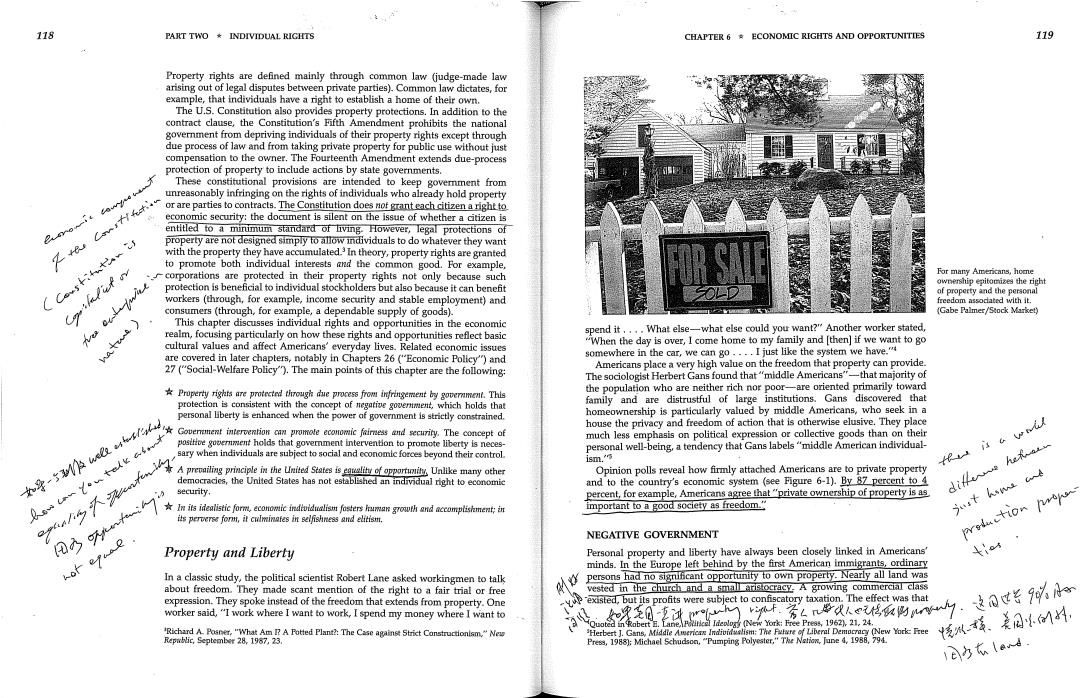
118 PART TWO INDIVIDUAL RIGHTS CHAPTER 6 ECONOMIC RIGHTS AND OPPORTUNITIES 119 Property rights are defined mainly through common law (judge-made law arising out of legal disputes between private parties).Common law dictates,for example,that individuals have a right to establish a home of their own. The U.S.Constitution also provides property protections.In addition to the contract clause,the Constitution's Fifth Amendment prohibits the national government from depriving individuals of their property rights except through due process of law and from taking private property for public use without just compensation to the owner.The Fourteenth Amendment extends due-process protection of property to include actions by state governments. These constitutional provisions are intended to keep government from unreasonably infringing on the rights of individuals who already hold property or are parties to contracts.The Constitution does nof grant each citizen a right to economic security:the document is silent on the issue of whether a citizen is entitled to a minimum standard of living.However,legal protections of property are not designed simply to allow individuals to do whatever they want with the property they have accumulatedIn theory,property rights are granted to promote both individual interests and the common good.For example, corporations are protected in their property rights not only because such Fot many Americans,homne protection is beneficial to individual stockholders but also because it can benefit of property and the workers (through,for example,income security and stable employment)and freedom assodated with it. consumers (through,for example,a dependable supply of goods). (Gabe Palmer/Stock Market) This chapter discusses individual rights and opportunities in the economic realm,focusing particularly on how these rights and opportunities reflect basic spend it....What else-what else could you want?"Another worker stated, "When the day is over,I come home to my family and [then]if we want to go cultural values and affect Americans'everyday lives.Related economic issues are covered in later chapters,notably in Chapters 26("Economic Policy")and somewhere in the car,we can go....I just like the system we have." 27("Social-Welfare Policy )The main points of this chapter are the following: Americans place a very high value on the freedom that property can provide. The sociologist Herbert Gans found that"middle Americans"-that majority of the population who are neither rich nor poor-are oriented primarily toward protection is consistent with the concept of negative govemment,which holds that family and are distrustful of large institutions.Gans discovered that personal liberty is enhanced when the power of government is strictly constrained. homeownership is particularly valued by middle Americans,who seek in a house the privacy and freedom of action that is otherwise elusive.They place 乎-sAue&yefd以 much less emphasis on political expression or collective goods than on their 置营量 rment holds that ent intervention to promote liberty is neces personal well-being,a tendency that Gans labels"middle American individual- m.% 宁之naeu色 A prevailing principle in the United States is equslit of opportuiny Unlike mamy other Opinion polls reveal how firmly attached Americans are to private property democracies,the United States has not established an individual right to economic and to the country's economic system (see Figure 6-1).By 87 percent to 4 di从ehe天a 恨是 security. percent,for example,Americans agree that "private ownership of property is as R办呀门 important to a good society as freedom." 4t人sa 车ec%onM,it culminafes in s2fss5Qd出tisn, proiuction pops NEGATIVE GOVERNMENT Property and Liberty Personal property and liberty have always been closely linked in Americans 4 minds.In the Europe left behind by the first American immigrants,ordinary In a classic study,the political scientist Robert Lane asked workingmen to talk persons had no significant opportunity to own property.Nearly all land was about freedom.They made scant mention of the right to a fair trial or free vested in the church and a small aristocracy.A growing commercial class expression.They spoke instead of the freedom that extends from property.One 欧风5dhF.法,以人元恺财4.2园便若9, profits were subject to confiscatory taxation.The effect was that worker said,"I work where I want to work,I spend my money where I want to Quoted in Robert E.Lane,Polesl Richard A Poser,"What Am A Potted Plant?The Caseagans Strict ConstruiNe SHerbert J.Gans,Middle Auericax Individuslism:The Fulare f Lberal De 悦州落.美园小M, Repicblic,September 28,1987,23. e乃衣{and
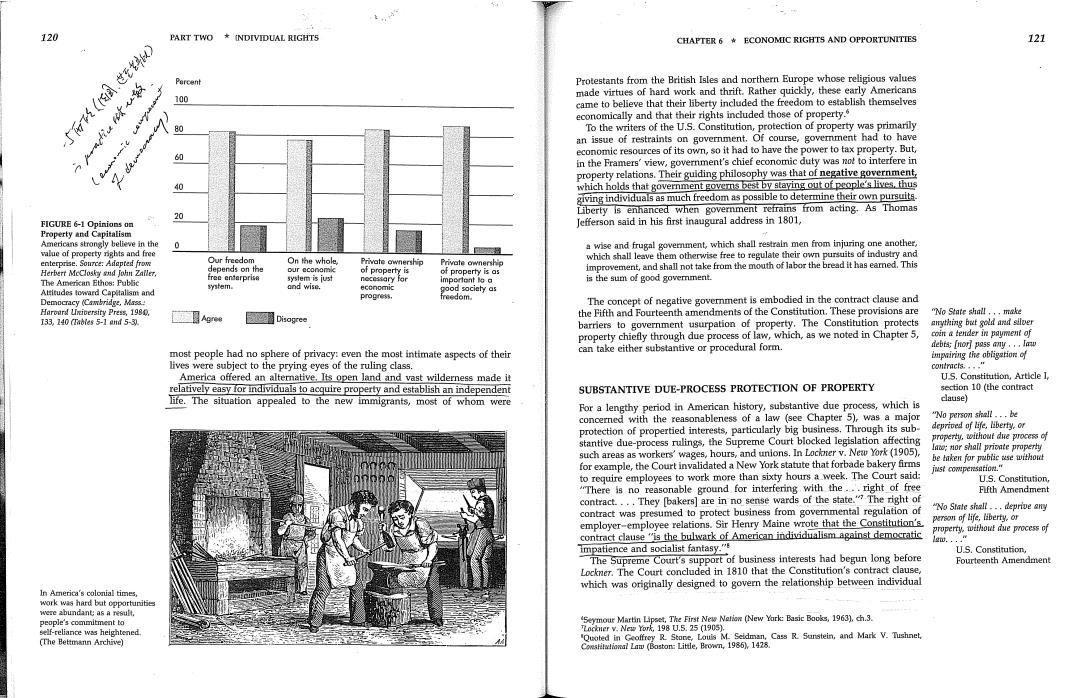
120 PART TWO (NDIVIDUAL RIGHTS CHAPTER 6 ECONOMIC RIGHTS AND OPPORTUNITIES 121 小而及(传国.世乏批) Protestants from the British Isles and northern Europe whose religious values u效 made virtues of hard work and thrift.Rather quickly,these early Americans 100 came to believe that their liberty included the freedom to establish themselves economically and that their rights included those of property. 80 To the writers of the U.S.Constitution,protection of property was primarily an issue of restraints on government.Of course,government had to have 6的 economie resources of its own,so it had to have the power to tax property.But, in the Framers'view,government's chief economic duty was not to interfere in property relations.Their guiding philosophy was that of negative government. 0 which holds that government governs best by staying out of people's lives,thus giving individuals as much freedom as possible to determine their own pursuits. 20 Liberty is enhanced when government refrains from acting.As Thomas FIGURE 6-1 Opinions on Jefferson said in his first inaugural address in 1801, Property and Capitalism Americans strongly believe in the 0 a wise and frugal government,which shall restraln men from injuring one another, value of property rights and free enterprise.Source:Adapted frow Our freedom On the whole Private ownership which shall leave them otherwise free to regulate their own pursuitsof industry and Private ownership of property is of property is as shall ot takefrom abr the.This The American Ethos:Public system is jus对 is the sum of good govemment. Attitudes toward Capitalism and good society as Democracy (Cswbridre,Msss The concept of negative government is embodied in the contract clause and 服Age Disagree the Fifth and Fourteenth amendments of the Constitution.These provisions are "No State shall. make I33,140es5-】a5-3. barriers to government usurpation of property.The Constitution protects aything but gold and silver property chiefly through due process of law,which,as we noted in Chapter 5, coin a tender in payment of most people had no sphere of privacy:even the most intimate aspects of their can take either substantive or procedural form. debts;[nor pass any...Iw mpiring the ablig婴iomc lives were subject to the prying eyes of the ruling class. contructs.,,” America offered an altemative.Its open land and vast wilderness made it U.S,Constitution,Article I, relatively easy for individuals to acquire property and establish an independent SUBSTANTIVE DUE-PROCESS PROTECTION OF PROPERTY section 10 (the contract life.The situation appealed to the new immigrants,most of whom were clause) For a lengthy period in American history,substantive due process,which is concerned with the reasonableness of a law (see Chapter 5),was a major 2N0s0刚sell..be protection of propertied interests,particularly big business.Through its sub- deprived o时fe,liberty.or stantive due-process rulings,the Supreme Court blocked legislation affecting property,pithout due proce寸 such areas as workers'wages,hours,and unions.In Locker v.New York(1905), be taken for pubiic wse without for example,the Court invalidated a New York statute that forbade bakery firms to require employees to work more than sixty hours a week.The Court said: U.S.Constitution, "There is no reasonable ground for interfering with the...right of free Fifth Amendment contract....They [bakers]are in no sense wards of the state."The right of contract was presumed to protect business from govermental regulation of "No State shalt...deprive any employer-employee relations.Sir Henry Maine wrote that the Constitution's P7sa时f,bery.o property,without due process of contract clause "is the bulwark of American individualism against democratic aw. impatience and socialist fantasy." U.S.Constitution, The Supreme Court's support of business interests had begun long before Fourteenth Amendment Lockner.The Court concluded in 1810 that the Constitution's contract clause, which was originally designed to govern the relationship between individual In America's colonial times, work was hard bat opportunities were abundant as a people's commitment to Seymour Martin Lipset,The First New Nalion (New Yark:Basic Books,1963).ch.3 self-reliance was heightened. TLocker v.Ne York,198 U.5.25 (1905) (The Bettmann Archive) Quoted in Geoffrey R Stone,Louis M.Seidm
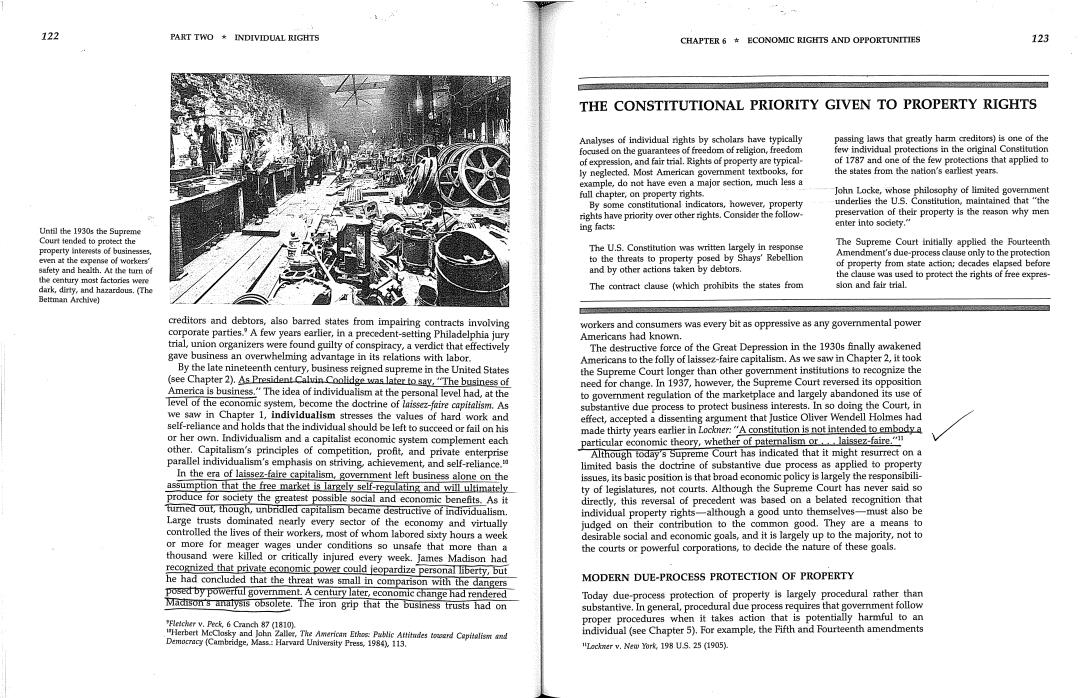
122 PART TWO INDIVIDUAL RIGHTS CHAPTER 6*ECONOMIC RIGHTS AND OPPORTUNITIES 123 THE CONSTITUTIONAL PRIORITY GIVEN TO PROPERTY RIGHTS Analyses of individual rights by scholars have typically passing laws that greatly harm creditors)is one of the focused on the guarantees of freedom of religion,freedom few individual protections in the original Constitution of expression,and fair trial.Rights of property are typical. of 1787 and one of the few protections that applied to ly neglected.Most American government textbooks,for the states from the nation's earliest years. example,do not have even a major section,much less a full chapter,on property rights. John Locke,whose philosophy of limited government By some constitutional indicators,however,property underlies the U.S.Constitution,maintained that "the rights have priorityover other rights.Consider the foilw preservation of their property is the reason why men Until the 1930s the Supreme ing facts: enter into society." Court tended to protect the The U.S.Constitution was written largely in response The Supreme Court initially appled the Fourteenth to the threats to property posed by Shays'Rebellion Amendment's due-process clause only to the protection even at the expense of workers safety and health.At the turn of and by other actions taken by debtors. of propertyfromseacion:decades elapsed before the clause was used to protect the rights of free expres- the century most factories were dark,dirty and hazardous.(The The contract clause (which prohibits the states from sion and fair trial. Bettman Archive) creditors and debtors,also barred states from impairing contracts involving workers and consumers was every bit as oppressive as any governmental power corporate parties.A few years earlier,in a precedent-setting Philadelphia jury Americans had known. trial,union organizers were found guilty of conspiracy,a verdict that effectively The destructive force of the Great Depression in the 1930s finally awakened gave business an overwhelming advantage in its relations with labor. Americans to the folly of laissez-faire capitalism.As we saw in Chapter 2,it took By the late nineteenth century,business reigned supreme in the United States (see Chapter 2).As President Calvin Coolidge was later tosay "The business of the Supreme Court longer than other government institutions to recognize the need for change.In 1937,however,the Supreme Court reversed its opposition America is business."The idea of individualism at the personal level had,at the to government regulation of the marketplace and largely abandoned its use of Tevel of the economic system,become the doctrine of issez-fire cmpitalism.As substantive due process to protect business interests.In so doing the Court,in we saw in Chapter 1,individualism stresses the values of hard work and effect,accepted a dissenting argument that Justice Oliver Wendell Holmes had self-rellance and holds that the individual should be left to succeed or fail on his made thirty years earlier in Lockner:"A constitution is not intended to embody a or her own.Individualism and a capitalist economic system complement each other.Capitalism's principles of competition,profit,and private enterprise particular economic theory,whether of patemalism orlaissez-faire." Although today's Supreme Court has indicated that it might resurrect on a parallel individualism's emphasis on striving achievement,and self-reliance. limited basis the doctrine of substantive due process as applied to property In the era of laissez-faire capitalism,government left business alone on the issues,its basic position is that broad economic policy is largely the responsibili- assumption that the free market is largely self-regulating and will ultimately ty of legislatures,not courts.Although the Supreme Court has never said so produce for society the greatest possible social and economic benefits.As it directly,this reversal of precedent was based on a belated recognition that furned out,though,unbridled capitalism became destructive of individualism individual property rights-although a good unto themselves-must also be Large trusts dominated nearly every sector of the economy and virtually judged on their contribution to the common good.They are a means to controlled the lives of their workers,most of whom labored sixty hours a week desirable social and economic goals,and it is largely up to the majority,not to or more for meager wages under conditions so unsafe that more than a the courts or powerful corporations,to decide the nature of these goals. thousand were killed or critically injured every week.James Madison had recognized that private economic power could jeopardize personal iberty,but he had concluded that the threat was small in comparison with the dangers MODERN DUE-PROCESS PROTECTION OF PROPERTY posedt by powerful government.A century later,economic change had rendered Today due-process protection of property is largely procedural rather than Madison's analysis obsolete.The iron grip that the business trusts had on substantive.In general,procedural due process requires that government follow "Flelcher v.Peck,6 Cranch 87 (1810) proper procedures when it takes action that is potentially harmful to an individual (see Chapter 5).For example,the Fifth and Fourteenth amendments Democracy (Cambridge,Mass:Harvard Unlveraity Press,1984)113. Lockmer v.New York,198 U.S.25 (1905)
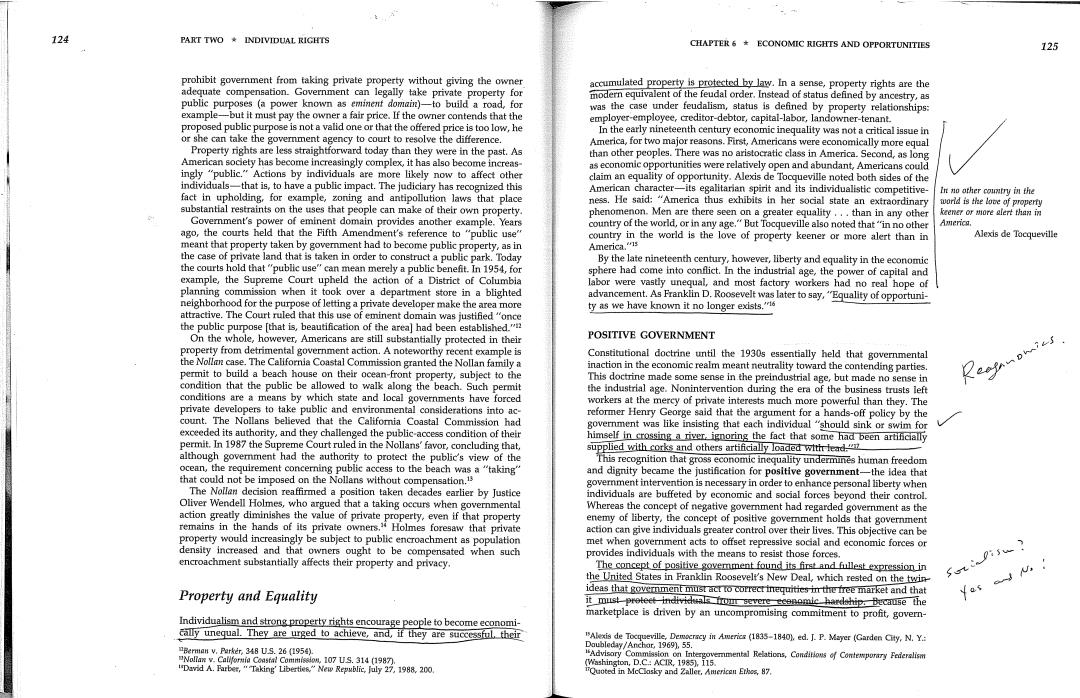
124 PART TWO INDIVIDUAL RIGHTS CHAPTER 6*ECONOMIC RIGHTS AND OPPORTUNITIES 125 prohibit government from taking private property without giving the owner accumulated property is protected by law.In a sense,property rights are the adequate compensation.Government can legally take private property for modern equivalent of the feudal order.Instead of status defined by ancestry,as public purposes (a power known as eminenf domain)-to build a road,for was the case under feudalism,status is defined by property relationships: example-but it must pay the owner a fair price.If the owner contends that the employer-employee,creditor-debtor,capital-labor,landowner-tenant proposed public purpose is not a valid one or that the offered price is too low,he In the early nineteenth century economic inequality was not a critical issue in or she can take the government agency to court to resolve the difference. America,for two major reasons.First,Americans were economically more equal Property rights are less straightforward today than they were in the past.As than other peoples.There was no aristocratic class in America.Second,as long American society has become increasingly complex,it has also become increas- as economic opportunities were relatively open and abundant,Americans could ingly "public."Actions by individuals are more likely now to affect other claim an equality of opportunity.Alexis de Tooqueville noted both sides of the individuals-that is,to have a public impact.The judiciary has recognized this American character-its egalitarian spirit and its individualistic competitive- fact in upholding,for example,zoning and antipollution laws that place ness.He said:"America thus exhibits in her social state an extraordinary world is the love of property substantial restraints on the uses that people can make of their own property phenomenon.Men are there seen on a greater equality...than in any other keener or more alert than in Government's power of eminent domain provides another example.Years country of the world,or in any age."But Tocqueville also noted that"in no other America. ago,the courts held that the Fifth Amendment's reference to "public use" country in the world is the love of property keener or more alert than in Alexis de Tocqueville meant that property taken by govemment had to become public property,as in America."s the case of private land that is taken in order to construct a public park.Today By the late nineteenth century,however,liberty and equality in the economic the courts hold that "public use"can mean merely a public benefit.In 1954,for sphere had come into conflict.In the industrial age,the power of capital and example,the Supreme Court upheld the action of a District of Columbia labor were vastly unequal,and most factory workers had no real hope of planning commission when it took over a department store in a blighted neighborhood for the purpose of letting a private developer make the area more advancement.As Franklin D.Roosevelt was later to say,"Equality of opportuni- ty as we have known it no longer exists."1 the puble pure hat b hmd be h On the whole,however,Americans are still substantially protected in their POSITIVE GOVERNMENT property from detrimental government action.A noteworthy recent example is Constitutional doctrine until the 1930s essentially held that governmental the Nollan case.The California Coastal Commission granted the Nollan family a inaction in the economic realm meant neutrality toward the contending parties. permit to build a beach house on their ocean-front property,subject to the This doctrine made some sense in the preindustrial age,but made no sense in condition that the public be allowed to walk along the beach.Such permit the industrial age.Nonintervention during the era of the business trusts left conditions are a means by which state and local governments have forced workers at the mercy of private interests much more powerful than they.The private developers to take public and environmental considerations into ac. reformer Henry George said that the argument for a hands-off policy by the count.The Nollans believed that the Califomia Coastal Commission had government was like insisting that each individual "should sink or swim for exceeded its authority,and they challenged the public-access condition of their permit.In 1987 the Supreme Court ruled in the Nollans'favor,concluding that, himself in crossing a river.ignoring the fact that some had been artificially supplied with corks and others artificially loaded with fead. although government had the authority to protect the public's view of the ocean,the requirement concerning public access to the beach was a"taking" This recognition that gross economic inequality undermines human freedom and dignity became the justification for positive government-the idea that that could not be imposed on the Nollans without compensation.1 government intervention is necessary in order to enhance personal liberty when The Nollen decision reaffirmed a position taken decades earlier by Justice individuals are buffeted by economic and social forces beyond their control. Oliver Wendell Holmes,who argued that a taking occurs when governmental Whereas the concept of negative govemment had regarded government as the m e ramde ormem rha e enemy of liberty,the concept of positive govemment holds that government action can give individuals greater control over their lives.This objective can be property would increasingly be subject to public encroachment as population met when government acts to offset repressive social and economic forces or density increased and that owners ought to be compensated when such provides individuals with the means to resist those forces. encroachment substantially affects their property and privacy. The concept of positive govemment found its first and fullest expression in the United States in Franklin Roosevelt's New Deal,which rested on the twin Property and Equality ideas that government must act to correct inequities in the free market and that it must proteet indivicals from severe ecenomic hardship.Because the marketplace is driven by an uncompromising commitment to profit,govern- Individualism and strong property rights encourage people to become economi- cally unequal.They are urged to achieve,and,if they are successful,their Berman v.Parker,348 US.26 (1954). NolTan v.Callforsfa Coastal Commissl 107Us.314198刀 "David A.Farbes,"Taking'Liberties"New Republic,july 27,1988,200 T
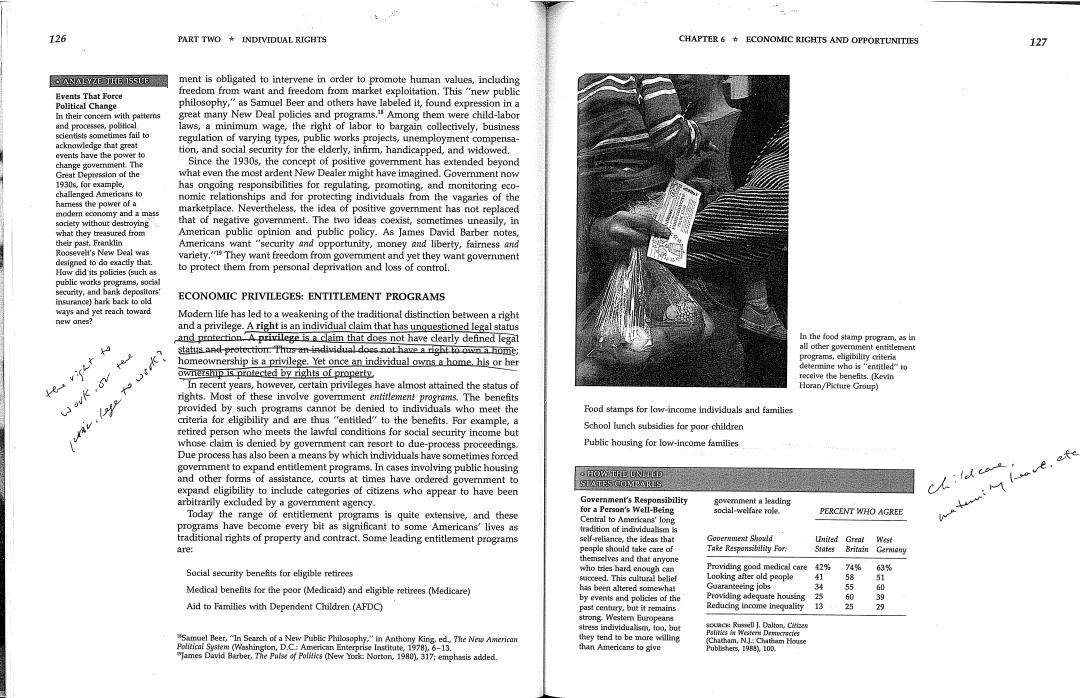
126 PART TWO INDIVIDUAL RIGHTS CHAPTER 6*ECONOMIC RIGHTS AND OPPORTUNITIES 127 ·LYZE THE155下溷 ment is obligated to intervene in order to promote human values,including Events That Force freedom from want and freedom from market exploitation.This "new public Political Chanee philosophy,"as Samuel Beer and others have labeled it,found expression in a In their concem great many New Deal policies and programs."Among them were child-labor and processes,political laws,a minimum wage,the right of labor to bargain collectively,business scientists sometimes fail to acknowledge that great regulation of varying types,public works projects,unemployment compensa- have the powe tion,and social security for the elderly,infimm,handicapped,and widowed. change government The Since the 1930s,the concept of positive government has extended beyond Great Depression of the what even the most ardent New Dealer might have imagined.Government now 1930s,for example, has ongoing responsibilities for regulating,promoting,and monitoring eco- harness the power of a nomic relationships and for protecting individuals from the vagaries of the modern economy and a mass marketplace.Nevertheless,the idea of positive government has not replaced sodety without destroying that of negative government.The two ideas coexist,sometimes uneasily,in what they treasured from American public opinion and public policy.As James David Barber notes, Americans want"security and opportunity,money and liberty,fairness and Rooseveit's New Doal was designed to do exactiy that. variety."They want freedom from govemnment and yet they want government Haw did its palicies (such as to protect them from personal deprivation and loss of control. public work insurance)hark back to old ECONOMIC PRIVILEGES:ENTITLEMENT PROGRAMS new anes? Modern life has led to a weakening of the traditional distinction between a right and a privilege.A right is an individual claim that has unquestioned legal status and protection.A privilege is a claim that does not have clearly defined legal In the food stamp program.as in status andprotection Thus nindividual does not have a right to ohome nt homeownership is a privilege.Yet once an individual owns a home,his or her determine who is“entitled”to ownership is protected by rights of property receive the benefits.(Kevin In recent years,however,certain privileges have almost attained the status of Horan/Picture Group) rights.Most of these involve government entitlemen!progrms.The benefits provided by such programs cannot be denied to individuals who meet the Food stamps for low-income individuals and families criteria for eligibility and are thus "entitled"to the benefits.For example,a retired person who meets the lawful conditions for social security income but School lunch subsidies for poor children whose claim is denied by government can resort to due-process proceedings. Public housing for low-income families Due process has also been a means by which individuals have sometimes forced government to expand entitlement programs.In cases involving public housing and other forms of assistance,courts at times have ordered government to expand eligibility to indlude categories of citizens who appear to have been StAT店5 OMPARES arbitrarily excluded by a govemment agency. Government's Responsibility govemment a leading Today the range of entitlement programs is quite extensive,and these for a Person's Well-Being social-welfare role. PERCENT WHO AGREE Central to Americans'long programs have become every bit as significant to some Americans'lives as tradition of individualism k traditional rights of property and contract.Some leading entitlement programs self-reliance,the ideas tha Goveramex对Should United Great West are: people should take care of States Britain Gerauy themselves and that anyone Providing good medical care 429% Social security benefits for eligible retirees who tres hard cnough 74% 63% Looking after old people 41 58 51 Medical benefits forthe poor(Medicaid)and eligible retirees(Medicare) Guaranteeing jobs by events and policies of the Providing adequate housing 9 Aid to Families with Dependent Children (AFDC) past century,but it remains Reducing income inequality 3 25 29 strong.We m Europeans stress individualism,too,but :Rusell J.Dalton. meBeer,Search ofa New Public Philosophy,"in Anthony they tend to be more willing Political Syste(Wiashin than Americans to give am House 9g100
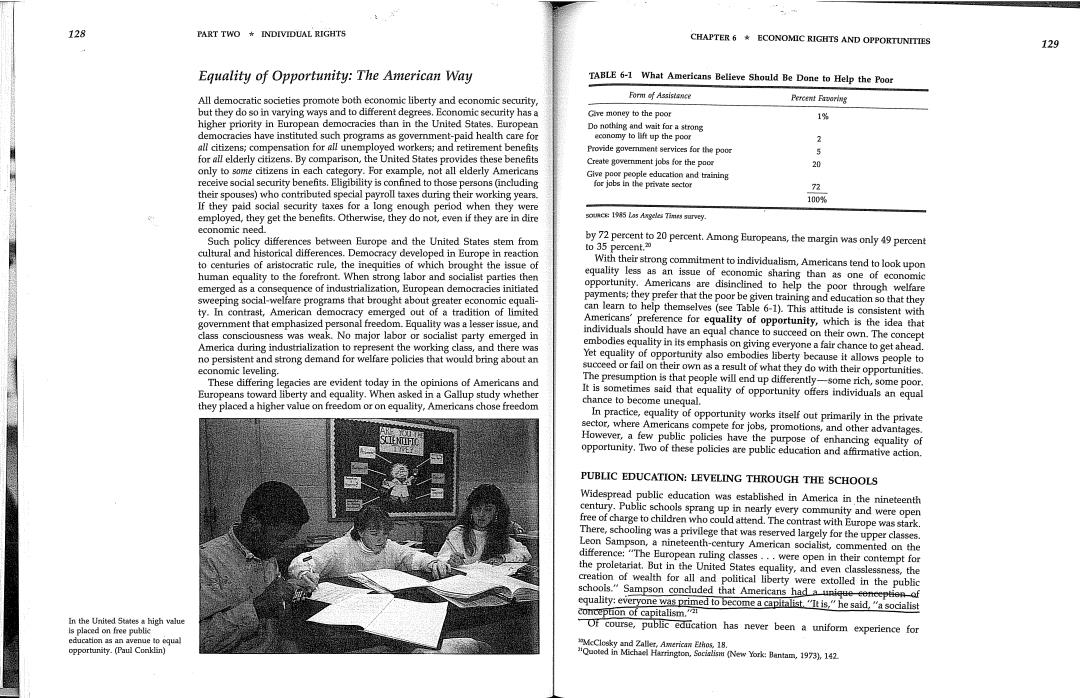
128 PART TWO INDIVIDUAL RIGHTS CHAPTER 6 ECONOMIC RIGHTS AND OPPORTUNITTES 129 Equality of Opportunity:The American Way TABLE 6-1 What Americans Believe Should Be Done to Help the Poor All democratic societies promote both economic liberty and economic security, Fomt可f Assistance Percent Favoring but they do so in varying ways and to different degrees.Economic security hasa Gve money to the poor 1% higher priority in European democracies than in the United States.European Do nothing and wait for a strong democracies have instituted such programs as government-paid health care for economy to lift up the poor 2 all citizens;compensation for all unemployed workers;and retirement benefits Provide goverment services for the poor 5 for all elderly citizens.By comparison,the United States provides these benefits Create government jobs for the poor 20 only to somie citizens in each category.For example,not all elderly Americans receive social security benefits.Eligibility is confined to those persons (including Give poor people education and training for jobs in the private sector 72 their spouses)who contributed special payroll taxes during their working years. If they paid social security taxes for a long enough period when they were 100% employed,they get the benefits.Otherwise,they do not,even if they are in dire :1985 Las Ange Timts survey. economic need. Such policy differences between Europe and the United States stem from by 72 percent to 20 percent.Among Europeans,the margin was only 49 percent o35 cultural and historical differences.Democracy developed in Europe in reaction to centuries of aristocratic rule,the inequities of which brought the issue of With their strong commitment to individualism,Americans tend to look upon human equality to the forefront.When strong labor and socialist parties then equality less as an issue of economic sharing than as one of economic emerged as a consequence of industrialization,European democracies initiated opportunity.Americans are disinclined to help the poor through welfare sweeping social-welfare programs that brought about greater economic equali- payments;they prefer that the poor be given training and education so that they ty.In contrast,American democracy emerged out of a tradition of limited can learn to help themselves(see Table 6-1).This attitude is consistent with government that emphasized personal freedom.Equality was a lesser issue,and Americans'preference for equality of opportunity,which is the idea that class consciousness was weak.No major labor or socialist party emerged in individuals should have an equal chance to succeed on their own.The concept America during industrialization to represent the working class,and there was embodies equality in its emphasis on giving everyone a fair chance to get ahead. no persistent and strong demand for welfare policies that would bring about an Yet equality of opportunity also embodies liberty because it allows people to economic leveling. succeed or fail on their own as a result of what they do with their opportunities. These differing legacies are evident today in the opinions of Americans and The presumption is that people will end up differently-some rich,some poor Europeans toward liberty and equality.When asked in a Gallup study whether It is sometimes said that equality of opportunity offers individuals an equal they placed a higher value on freedom or on equality,Americans chose freedom chance to become unequal. In practice,equality of opportunity works itself out primarily in the private sector,where Americans compete for jobs,promotions,and other advantages. However,a few public policies have the purpose of enhancing equality of opportunity.Two of these policies are public education and affirmative action. PUBLIC EDUCATION:LEVELING THROUGH THE SCHOOLS Widespread public education was established in America in the nineteenth century.Public schools sprang up in nearly every community and were open free of charge to children who could attend.The contrast with Europe was stark. There,schooling was a privilege that was reserved largely for the upper classes Leon Sampson,a nineteenth-century American socialist,commented on the difference:"The European ruling classes...were open in their contempt for the proletariat.But in the United States equality,and even classlessness,the creation of wealth for all and political liberty were extolled in the public schoois."Sampson concluded that Americans had a unigue-eeneeptien-of equality:everyone was primed to become a capltalist "It is,"he said,"a socialist conception of capitalism." In the United States a high value s placed on free public Of course,public education has never been a uniform experience for education as an avenue to equal opportunity.(Paul Conklin)

130 PART TWO INDIVIDUAL RIGHTS CHAPTER 6*ECONOMIC RIGHTS AND OPPORTUNITIES 131 American children.Cities in the late nineteenth century neglected the education because they can end up favoring women and minorities over white males,an of many immigrant children,who were thereby placed at a permanent outcome that is called "reverse discrimination."Although there is no evidence &k disadvantage.And of course,souther schools for black children in the that reverse discrimination is rampant (and plenty of evidence that white males segregationist era were designed to subjugate them,not to educate them. still have an edge in educational and marketplace opportunities),the idea that Today,whether an American child gets a good education depends to a minorities and women may receive preferential treatment in some instances has signincant extent on the wealth of the community in which he or she resides.In resulted in attacks on affirmative action. 1973 the Supreme Court ruled that education of high quality is not a right to which all children are entitled.This ruling came in response to a suit initiated on behalf of students in a poor and largely Hispanic school district in San Antonio, The Bakke Case:Clouding the Issue which had an annual budget of$356 per pupil.By comparison,a school district Affirmative action was first tested before the Supreme Court in University of in a nearby wealthy suburb spent $594 per pupil per year.In deciding that Texas Californin Regents v.Bakke (1978).Alan Bakke,a white man,had twice been was not obliged to equalize per-pupil spending in its schools,the Supreme denied admission to the medical school of the University of California at Davis, Court concluded that education "is not among the rights afforded explicit even though his admission test scores were higher than those of several protection under [the]Constitution.Nor...[is it]implicitly so protected."A minority-group students who had been accepted.Bakke sued,claiming that the state is obliged only to provide "an 'adequate'edueation for alt chilttren,"not medical school had admitted less qualified minority students through an 'equal quality of education affirmative action program that set aside sixteen places for such students.In a Nevertheless,the United States through its public schools has educated a 5-4 decision with six separate opinions,the Court ruled in Bakke's favor and broad segment of the population.Arguably,no country in the world has made ordered the university to admit him an equivalent effort to give children,whatever their parents'backgrounds,an Although the Bakke case was a setback for advocates of affirmative action,the equal opportunity in life through education.The United States ranks first in the Supreme Court did not invalidate the policy.The Court said that race could be world in per capita spending on education and first in the proportion of adults one consideration in admission policy,along with such other considerations as receiving a college education.In the United States,about 40 percent of young test scores and extracurricular activities,as long as no rigid racial quotas were people eventually go on to college,compared with 10 percent in Britain,for imposed.Writing for four justices on the majority side,Justice William Brennan example. concluded that race could-and should-be taken into account in opportunity decisions:"We cannot and...need not under our Constitution...let color AFFIRMATIVE ACTION:PROVIDING GENUINE OPPORTUNITY blindness become myopia which masks the reality that many 'created equal have been treated within their lifetimes as inferior both by law and by their Opportunity in America has never been as equal in practice as it is in theory fellow citizens." When women and members of minority groups seek a job or a promotion,they are more likely than white males to find that an employer wanis someone else. Few employers today are likely to say outright that they prefer a white male to a Subsequent Cases:Clarifying the Issue woman or a black person,but the statistics speak for themselves.White males Bakke was followed by two rulings in favor of affirmative action programs,one of get more jobs,better pay,and more promotions than do members of other which-Fullilove v.Kiufznick (1980)-upheld a quota system that required 10 groups (see Chapter 7). percent of federal public works funds to be awarded to minority-owned firms.2 Affirmative action programs are a response to this chronic discrimination in These initial decisions created uncertainty about the precise criteria for deter the marketplace.Affirmative action is a deliberate effort to provide full and equal opportunities in employment,education,and other situations for women, mining the legality of a particular affirmative action program.Not until halfway through the 1980s did the Supreme Court begin to define the permissible minorities,and individuals belonging to other traditionally disadvantaged remedies more exactly.The rules were spelled out in a series of decisions that groups.Affirmative action requires corporations,universities,and other organi- are described in Chapter 7.Here it is necessary only to summarize the Court's zations to establish programs designed to ensure that all applicants are treated position. fairly.Affirmative action also places the burden of proof on the providers of According to the Supreme Court,affirmative action remedies that give opportunities;to some extent,they must be able to demonstrate that any preference to minorities and women are lawful when they are narrowly tailored disproportionate granting of opportunities to white males is not the result of to a particular situation and when they are designed to correct clear-cut cases of discriminatory practices. past discrimination.In other words,when an organization is guilty of unlawful In the abstract,affirmative action is not a controversial idea.Most Americans and substantial discrimination,it can be compelled to rectify the situation say that minorities and women deserve a truly equal chance at jobs and other opportunities.Yet affirmative action programs are controversial in practice through a program that benefits individuals who belong to groups victimized SsN Antomio Independent School District v.Rodrigwez,411 U.S.1 (1973). See Allan P.Sindler,Bakke,DeFunis,and Mimority Admissions:The Ques!for Equal Opportunity New Yodc Lo ,1978 sidney Verba and Gary Orren,Equslity i America(Cambridge,Mass.:Harvard Unhversity Press. 19851ch1, s.8,438U5.265978) ers v.Weber,(19);Fullilowe v.,448 U5.448(1980)
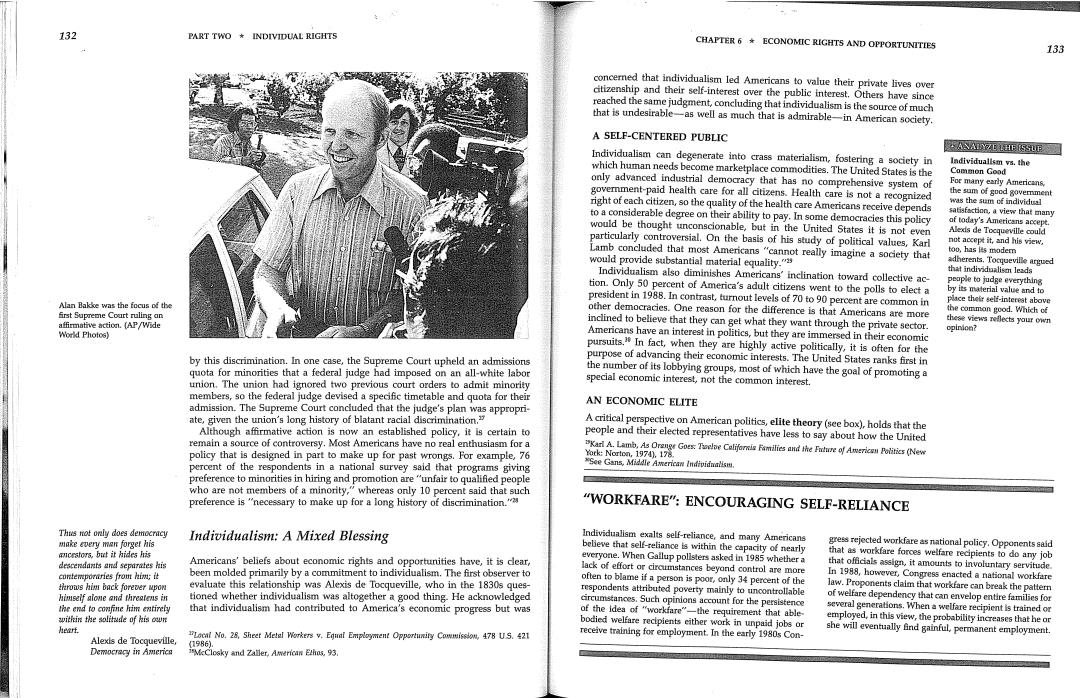
132 PART TWO INDIVIDUAL RIGHTS CHAPTER 6*ECONOMIC RIGHTS AND OPPORTUNITIES 133 concerned that individualism led Americans to value their private lives over citizenship and their self-interest over the public interest.Others have since reached the same judgment,concluding that individualism is the source of much that is undesirable-as well as much that is admirable-in American society. A SELF-CENTERED PUBLIC Individualism can degenerate into crass materialism,fostering a society in ANADYE LHF ISSUE which human needs become marketplace commodities.The United States is the Individualism vs.the Common Good only advanced industrial democracy that has no comprehensive system of For many early Americans. goverment-paid health care for all citizens.Health care is not a recognized the sum of gocd govemment right of each citizen,so the quality of the health care Americans receive depends was the sum of individual toa considerable degree on their ability to pay.In some democracies this policy satisfaction,a view that many would be thought unconscionable,but in the United States it is not even of today's Ameticans accept. particularly controversial.On the basis of his study of political values,Karl Aleds de Tocqueville could not accept it,and his view, Lamb concluded that most Americans"cannot really imagine a society that too,has lts modem would provide substantial material equality." queville argued Individualism also diminishes Americans'inclination toward collective ac- that individualismn leads tion.Only 50 percent of America's adult citizens went to the polls to elect a people to judge everything president in 1988.In contrast,turnout levels of 70 to90 percent are common in by its material value andt place their self-in Alan Bakke was the focus of the e eot abov comman good.Which of arst Supreme Court ruling on other democracies.One reason for the difference is that Americans are more action.(AP/Wide inclined to believe that they can get what they want through the private sector. these views reflects your own Americans have an interest in politics,but they are immersed in their economic optnion? pursuits."In fact,when they are highly active politically,it is often for the by this discrimination.In one case,the Supreme Court upheld an admissions purpose of advancing their economic interests.The United States ranks first in quota for minorities that a federal judge had imposed on an all-white labor the number of its lobbying groups,most of which have the goal of promotinga union.The union had ignored two previous court orders to admit minority special economic interest,not the common interest. members,so the federal judge devised a specific timetable and quota for their admission.The Supreme Court concluded that the judge's plan was appropri- AN ECONOMIC ELITE ate,given the union's long history of blatant racial discrimination. A critical perspective on American politics,elite theory(see box),holds that the Although affirmative action is now an established policy,it is certain to people and their elected representatives have less to say about how the United remain a source of controversy.Most Americans have no real enthusiasm for a policy that is designed in part to make up for past wrongs.For example,76 KaLAsrGoCelif FmiliesFAr Pottics (New percent of the respondents in a national survey said that programs giving g杰&Infd preference to minorities in hiring and promotion are"unfair to qualified people who are not members of a minority,"whereas only 10 percent said that such preference is "necessary to make up for a long history of discrimination." "WORKFARE:ENCOURAGING SELF-RELIANCE Thus not only does democracy Individualism exalts self-reliance,and many Americans forget hi Individualism:A Mixed Blessing ancestors,but it hides his beleve that self-reliance s within the capacity ofnearly gress rejected policy.Opponents said Americans'beliefs about economic rights and opportunities have,it is dear, everyone.When Gallup pollsters asked in 1985 whether a that as workfare foroes welfare recipients to do any job descendants and sepurates his lack of effort or circumstances beyand control are more that officials assign,it amounts to involuntary servitude. cortemtporaries from him;it been molded primarily by a commitment to individualism.The first observer to In 1988,however,Congress enacted a national workfare throws him back forever wpon evaluate this relationship was Alexis de Tocqueville,who in the 1830s ques- often to blame if a person is poor,only 34 percent of the respondents attributed poverty mainly to uncontrollable law.Proponents claim that workfare can break the pattern himseif alone and threatens in tioned whether individualism was altogether a good thing He acknowledged circumstances.Such opinions account for the persistence of welfare dependency that can envelop entire families for the end to comfine him entirely that individualism had contributed to America's economic progress but was of the idea of "workfare"-the requirement that able- several generations.When a weifare recipient is trained or ititin the solitude时hsww bodied welfare recipients either work in unpaid jobs or employed,in this view,the probability increases that he or she will eventually find gainful,permanent employment. Alexis de Tocqueville, receive training for employment.In the earty 1980s Con
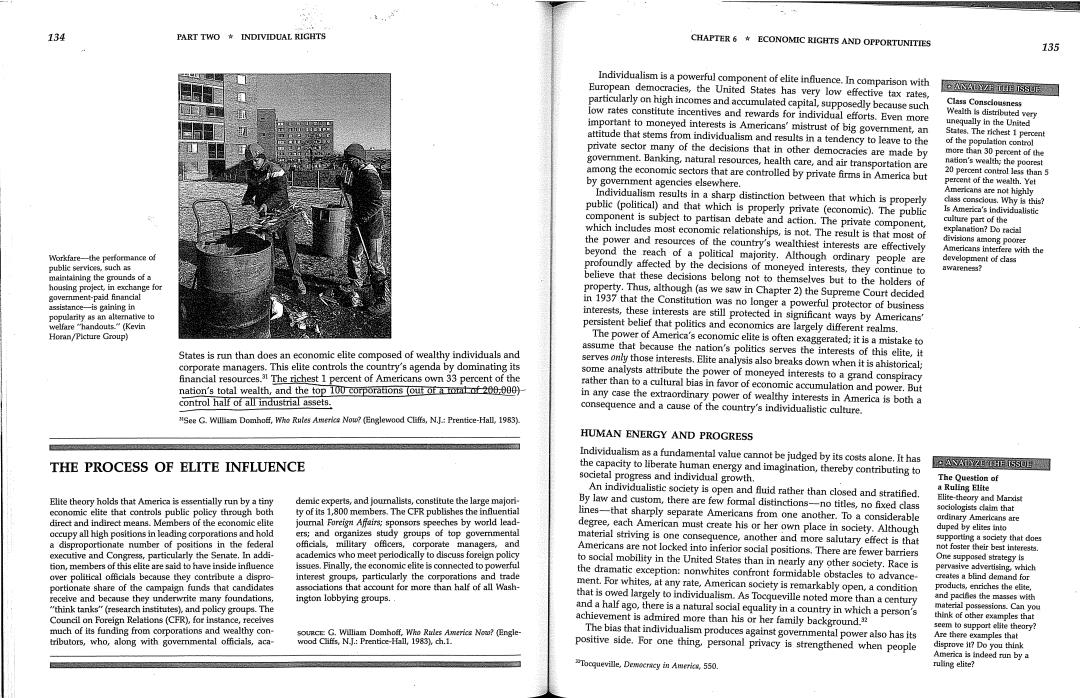
t, 134 PART TWO INDIVIDUAL RIGHTS CHAPTER 6 ECONOMIC RIGHTS AND OPPORTUNITIES 135 Individualism is a powerful component of elite influence.In comparison with European democracies,the United States has very low effective tax rates NAUYA店TmsS particularly on high incomes and accumulated capital,supposedly because such Class Consclousness low rates constitute incentives and rewards for individual efforts.Even more Wealth s distributed very important to moneyed interests is Americans'mistrust of big goverment,an unequally in the United attitude that stems from individualism and results in a tendency to leave to the The respe cent private sector many of the decisions that in other democracies are made by government.Banking,natural resources,health care,and air transportation are oeh30 peroent of he among the economic sectors that are controlled by private firms in America but 对pma by government agencies elsewhere. percent of the wealth.Yot Individualism results in a sharp distinction between that which is properly Americans are not highly public (political)and that which is properly private (economic).The public ss conscious.Why is this? Is America's individualistic component is subject to partisan debate and action.The private component, cultire part of the which includes most economic relationships,is not.The result is that most of explanation?Do tacis the power and resources of the country's wealthiest interests are effectively ons among poorer Workfare-the performance of beyond the reach of a political majority.Although ordinary people are Americans interfere with the development of class public servioes,such as profoundly affected by the decisions of moneyed interests,they continue to awareness? maintaining the grounds of housing project,in exchange for believe that these decisions belong not to themselves but to the holders of government-paid financial property.Thus,although(as we saw in Chapter 2)the Supreme Court decided ssistance-一is gaining in in 1937 that the Constitution was no longer a powerful protector of business ative to interests,these interests are still protected in significant ways by Americans welfare "handouts."(Kevin persistent belief that politics and economics are largely different realms. Horan/Plcture Group) The power of America's economic elite is often exaggerated;it is a mistaketo States is run than does an economic elite composed of wealthy individuals and assume that because the nation's politics serves the interests of this elite,it corporate managers.This elite controls the country's agenda by dominating its serves only those interests.Elite analysis also breaks down when it is ahistorical; financial resources.3 The richest 1 percent of Americans own 33 percent of the some analysts attribute the power of moneyed interests to a grand conspiracy nation's total wealth,and the top 100 corporations (ouf of a ropadl of 200,00) rather than to a cultural bias in favor of economic accumulation and power.But control half of all industrial assets. in any case the extraordinary power of wealthy interests in America is both a consequence and a cause of the country's individualistic culture. MSee G.William Domhod.Who Rules Aterice Now?(Englewood Cliffa,N.J:Prentice-Hall,1983) HUMAN ENERGY AND PROGRESS Individualism as a fundamental value cannot be judged by its costs alone.It has THE PROCESS OF ELITE INFLUENCE the capacity to liberate human energy and imagination,thereby contributing to AVATYZETHF T5SUL societal progress and individual growth. The Question of An individualistic society is open and fluid rather than closed and stratified. a Ruling Elite Ellte theory holds that America is essentially run by a tiny demic experts,and journalists,constitute the large majori By law and custom,there are few formal distinctions-no titles,no fixed class Elite-theory and Mardst mnk2a的 ty of its 1,800 members.The CFR publishes the influential joumal Foreign Afairs:sponsors speeches by world lead lines-that sharply separate Americans from one another.To a considerable sociologists daim that ers;and organizes study groups of top govermental degree,each American must create his or her own place in society.Although y Americans are duped by elites into occupy all high positions in leading corporations and hold a disproportionate number of positions in the federal officials,military officers,corporate managers,and material striving is one consequence,another and more salutary effect is that supporting a society that does not foster their best interest executive and Congress,particularly the Senate.In addi- academics who meet perlodically to discuss foreign policy Americans are not locked into inferior social positions.There are fewer barriers tion,members of this elite are said to have inside influence to social mobility in the United States than in nearly any other society.Race is One suppa sed strategy is issues.Finally,the economic elite is connected to powerful the dramatic exception:nonwhites confront formidable obstacles to advance- pervasive advertising,which over political officials because they contribute a dispro- interest groups,particularly the corporations and trade creates a blind demand for portionate share of the campaign funds that candidates associations that account for more than half of all Wash ment.For whites,at any rate,American society is remarkably open,a condition that is owed largely to individualism.As Tocqueville noted more than a century products,enriches the elite receive and because they underwrite many foundations, ington lobbying groups. and padfes the masses with "think tanks"(research institutes)and policy groups.The and a half ago,there is a natural social equality in a country in which a person's naterial possessions.Can you Council on Foreign Relations(CFR),for instance,receives achievement is admired more than his or her family background.32 think of other examples that much of its funding from corporations and wealthy con- SouRcE G.William Domhoff,Who Rmles Americs Noo?(Engle- The bias that individualism produces against governmental power also has its seem to support elite theary? positive side.For one thing.personal privacy is strengthened when people Are there mples that tributors,who,along with govemmental officials,aca- wood Chffs,N.J.:Prentice-Hall,1983),ch.1. disprove it?Do you think America is indeed run by a ruling elite?